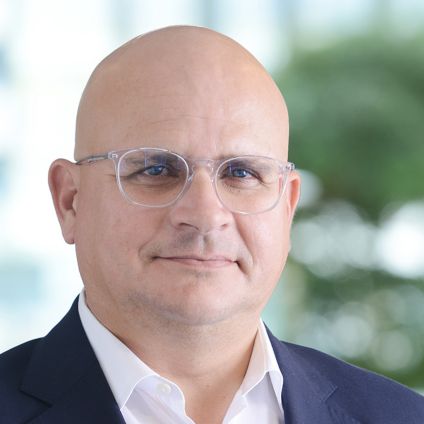At KPMG, we are grateful for the opportunity to write this publication on the future of the insurance sector in 2030 through the visionary lenses of CEOs and business leaders.
This report is a spin-off from the 30 Voices on Financial Services (FS) report that we made in collaboration with Febelfin / Financial Forum.
We took the opportunity to dig a bit deeper into the vision for the insurance sector, and more specifically into the challenges and opportunities for the insurance and pensions sector, while keeping the more generic FS/Banking Voices report fully intact and relevant.
In a rapidly changing world, projecting ourselves into the future and imagining how our world and our businesses may look is a real challenge.
Who would have predicted 7 years ago that our world would be shaken up by a global pandemic with millions of deaths, with businesses and countries locked-down for months, and forever changing the way we live, work, and do business?
Who would have predicted that we would once again have a horrific war in Europe; that there would be a global scarcity of commodities, inflation would hit the ceiling, and interest rates would be back to levels we had almost forgotten?
The answer is very simple: systems are unstable and even small initial changes to the system may have unpredictable, even large, effects.
The crux is that the insurance industry is relevant thanks to the existence of uncertainty, and as such, increasing uncertainty accentuates the relevance of this industry even more!
As our Belgian Nobel prize winner Ilya Prigogine rightfully stated: “The future is uncertain, but this uncertainty is at the very heart of human creativity.” And that same creativity can pave the road to being either relevant or obliterated in 2030.
Still, if the future is a long tunnel down which we can only peer dimly, the light coming from the end does at least provide some illumination. And 2030 is close enough to start shedding some light on - especially with the help of some of the industry’s most inspirational and imaginative leaders. We have turned to these far-sighted Voices, with expertise from across the insurance sector, for this report. Each of our interviewees provides a unique view of what to expect in 2030.
Their views differ in many interesting ways and while not all topics were discussed in the same level of detail with all participants, certain themes unite them. Above all, they expect the boundaries between financial services - as well as with other industries - to become increasingly blurred. Sector convergence has already begun, enabled and driven by new technology and innovation, but that is set to continue at pace. Concepts such as embedded insurance, the platform ecosystem and the data economy may render traditional providers decreasingly relevant, although all players foresee that distribution through brokers and consolidated broker networks will remain important, albeit that the role of these actors will fundamentally change.
Our Voices also speak as one on the imperative to leave the world in a better place than we found it. They expect the environmental, social, and governance (ESG) transition of recent years to evolve and expand - ensuring that insurance companies drive positive change. That may include climate change mitigation, but also social justice, equality, diversity, and fairness.
The Insurance sector has de natura always played a significant role as the organizing body of solidarity, and this role will only increase in the coming years.
Elsewhere, many of our interviewees sense a power shift. They anticipate data driving new business models and undermining existing ways of operating. But crucially, they also expect customers to recognize and enjoy clear benefits as they grant access to their data to trusted partners and businesses. Availability of more granular data will also help insurers to anticipate needs of individual customers and the challenges that our society faces - the demographic evolution is a good example.
Of course, not every prediction made during the course of this research will come true - and you will have your own views about where we are heading. But that’s the point: our aim with Voices On 2030 is to stimulate debate; to shed some light on the future without pretending to have all the answers. I hope you enjoy reading this report and please do share its insights far and wide.
In the meantime, KPMG thanks everyone who agreed to give their time and share their expertise for this project. Every interviewee had fascinating insights to contribute and we’re grateful for their collaboration.
Now it is your turn to think about what comes next, because in essence and in the words of the ancient Greek statesman, philosopher, and military leader, Pericles: “The key is not to predict the future, but to prepare for it”.
We wish you a thought-provoking walk on your path towards 2030!
Relive our "The Future of Insurance" launch event
Voices on 2030
Through the visionary lenses of CEOs and business leaders from the insurance industry we explore a future where technology and data drive further sector convergence between financial services.
- Vincent Van Peteghem - We’ll go all the way for the protection of the citizen
- Mária Kamenárová - From private to social insurance
- Bart De Smet - AI helped us anticipate customer needs and is vital for pricing, underwriting and claims handling
- Cedric De Vleeschauwer - The bulk of the insurance process is digitized and automated
- Hein Lannoy - Our industry has regained its attractiveness
- Dorsan Van Hecke - The insurance industries and governments need each other
- Jef Van In - The insurance agent is not dead!
- Henk Janssen - The emotional connection remains crucial
- Marc Raisière - The banks of 2030 are those that are prepared for the arrival of new entrants
- Annie Courbet, Patrick Cauwert & Erik Weekers - The diversity of clients is reflected in the diversity of brokers
- Laurent Feiner - Insurers remained strong, if they knew how to adapt
- Tom De Troch - For newcomers, distribution remains the most difficult challenge
- Alessandra Guion - Power to the consumers!
- Koen Van Loo - A dark and disturbing fairy tale
- Jean-Paul Servais - Technology is a gamechanger, also for us as a regulator
- Ine Cops - Customer experience is everything today. Everything.
- Johan Thijs - Banking is a blend of analog and digital, courtesy of the level playing field
- Amélie Breitburd - We now better understand the need for mutualization across the planet
- Didier Ongena - The banking world has become a world of building blocks
- Koen Depaemelaere - Climate and longevity have completely changed our industry
- Jean Hilgers - As a central bank, we ensure that there are safeguards in place
- Etienne de Callataÿ - Respect is the watchword
- Ann Verlinden & Brigitte Bocqué - We will always be long-term investors
- Jan Peeters - Collaboration is the key word
- Quentin Colmant - Welcome to the era of embedded insurance
- Arjan Smedeman - Speed boats around oil tankers
- Pedro Matthyssens - The solidarity mechanism in insurance has come under pressure but remains crucial
- Steve Muylle - From loss compensation to loss prevention
Predictions for 2030
It’s 2030, and the insurance industry is still undergoing continued, major transformations. The industry has expanded beyond traditional sectors, leading to the coexistence of various business models, including scale players, specialized niche players, embedded insurance and trusted/love brands. Regulatory changes and the need for increased investments in systems development have forced insurers to focus, make choices and prepare for the changing business model landscape.
Operating models have evolved with an increased presence of service providers that can cover different parts of the value chain and smart choices are made in line with a company’s view on where it has a ‘right to win’.
In response to the evolving needs and expectations of customers, insurance solutions have adapted and become more personalized. The use of intelligent automation (AI) has brought increased transparency in the main insurance processes and has led to improved customer satisfaction when settling claims. Furthermore, data-based segmentation and pricing has resulted in more prevention and smart utilization of insurance.
Insurance brokers are more consolidated and have transformed into specialized risk managers, estate and wealth managers. They increasingly take charge of more parts of the insurance value chain and play a critical role in the industry's evolution, alongside other established channels.
Data and AI are important engines of change in this decade, but their use has given rise to questions about appropriateness which the sector needs to address. Insurers have used all their levers to be catalysts in the transition towards Environmental, Social, and Governance (ESG) goals.
Finally, renewed collaborations between insurers, reinsurers and the government have enabled the sector to address the insurability of new risks, including climate-related risks, leading to a more robust and sustainable insurance sector.
In conclusion, the insurance industry is poised for significant change in the next decade. And while it may not necessarily be seen as a revolution, it will still be a major evolution fueled by changing customer needs and technology; with all the related opportunities and risks. As the industry adapts to these changes, it will continue to play a critical role in providing security and protection to individuals and businesses alike.







